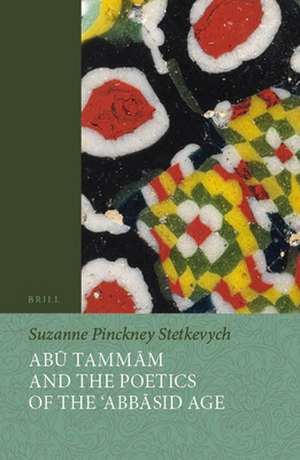Abū Tammām and the Poetics of the ʿAbbāsid Age
Autor Suzanne Pinckney Stetkevychen Limba Engleză Paperback – 5 feb 2020
The present study offers a reevaluation of the Arabic literary dispute over Abū Tammām and badīʿ. It then proposes a redefinition of his diwan and of his major anthology, the Ḥamāsah, as a metapoesis that served to decode the poetic tradition of the pre-Islamic desert for the Islamic ʿAbbāsid caliph and his urbane and urban courtiers and subjects, and conversely, to encode contemporary Arab-Islamic political experiences in classical form.
This book is extensively illustrated with original translations.
Preț: 337.12 lei
Nou
Puncte Express: 506
Preț estimativ în valută:
64.51€ • 68.98$ • 53.79£
64.51€ • 68.98$ • 53.79£
Carte indisponibilă temporar
Doresc să fiu notificat când acest titlu va fi disponibil:
Se trimite...
Preluare comenzi: 021 569.72.76
Specificații
ISBN-13: 9789004425514
ISBN-10: 9004425519
Dimensiuni: 155 x 235 mm
Greutate: 0.59 kg
Editura: Brill
Colecția Brill
ISBN-10: 9004425519
Dimensiuni: 155 x 235 mm
Greutate: 0.59 kg
Editura: Brill
Colecția Brill
Notă biografică
Suzanne P. Stetkevych is Sultan Qaboos bin Said Professor of Arabic & Islamic Studies at Georgetown University, Executive Editor of the book series Brill Studies in Middle East Literatures and co-winner of the Shaikh Zayed Book Award for Cultural Personality of the Year 2019. She received her Ph.D. in 1981 in Classical Arabic Literature from the University of Chicago. She has published in the International Journal of Middle Eastern Studies, Journal of Semitic Studies and others.
Recenzii
"...a pioneering effort... This is a very important book and will be required reading for everyone interested in Abu Tammam and Abbasid poetry in general."
International Journal of Middle East Studies, 25.
"...eine scharfsinnige und kenntnisreiche Studie, die unser Verständnis der Abbasidendichtung wesentlich fördert."
Renate Jacobi, Zeitschrift für Geschichte der arabisch-islamischen Wissenschaften, 1993.
"...a mature work free from triviality and graced with a wealth of intelligent explanatory notes."
J. Derek Latham, Journal of Semitic Studies, 1992.
"...stimulating and neatly produced monograph...original..."
Geert Jan van Gelder, TLS, 1992.
"Il s'agit d'un ouvrage qui contient plusieurs idées intèressantes, des points de vue originaux, des formulations heureuses d'idées…"
Lidia Bettini, Bulletin Critique des Annales Islamologiques, 1994.
"This book by Stetkevych is very stimulating and thought provoking."
A. Schippers, Bibliotheca Orientalis, 1995.
"Suzanne Stetkevych's book is a landmark study and an outstanding scholarly achievement."
Peter Heath †, Journal of Near Eastern Studies, 1996.
International Journal of Middle East Studies, 25.
"...eine scharfsinnige und kenntnisreiche Studie, die unser Verständnis der Abbasidendichtung wesentlich fördert."
Renate Jacobi, Zeitschrift für Geschichte der arabisch-islamischen Wissenschaften, 1993.
"...a mature work free from triviality and graced with a wealth of intelligent explanatory notes."
J. Derek Latham, Journal of Semitic Studies, 1992.
"...stimulating and neatly produced monograph...original..."
Geert Jan van Gelder, TLS, 1992.
"Il s'agit d'un ouvrage qui contient plusieurs idées intèressantes, des points de vue originaux, des formulations heureuses d'idées…"
Lidia Bettini, Bulletin Critique des Annales Islamologiques, 1994.
"This book by Stetkevych is very stimulating and thought provoking."
A. Schippers, Bibliotheca Orientalis, 1995.
"Suzanne Stetkevych's book is a landmark study and an outstanding scholarly achievement."
Peter Heath †, Journal of Near Eastern Studies, 1996.
Cuprins
Acknowledgments
Note on Translations
Preface
Part One: Abū Tammām and the Arabic Critical Tradition
Introduction
1. A Reformulation of Badīʿ
2. Al-Ṣūlī's Akhbār Abī Tammām
3. Al-Āmidī's Muwāzanah
4. Al-Jurjānī's Wasāṭah
Conclusion
Part Two: Panegyrist to the Caliphal Court
Introduction
5. Time's Beardless Youth: A Panegyric to the Caliph al-Maʾmūn
6. The Tragacanth's Fruit: A Panegyric to Abū Saʿid Thaghrī
7. A Morsel in Destruction's Hand: A Panegyric to al-Muʿtaṣim on the Capture of Bābak al-Khurramī
8. The Virgin whom the Hand of Fate Had Not Deflowered: The Panegyric to al-Muʿtaṣim on the Conquest of ʿAmmūriyah
9. The Poet Sets His Brilliant Gems: The Panegyric to al-Muʿtaṣim on the Immolation of al-Afshīn
Conclusion
Part Three: Abū Tammām and the Arabic Anthology
Introduction
10. The Process of Collection: Hadīth and Poetry
11. The Ḥamāsah as Literary Ijmāʿ
12. Composition and Conception of the Ḥamāsah
13. Bāb al-Ḥamāsah: Theme and Variations
14. Metaphorical Relationships
15. Antithetical Relationships: Bāb al-Hijāʾ
Conclusion
Appendix
Bibliography
Index
Note on Translations
Preface
Part One: Abū Tammām and the Arabic Critical Tradition
Introduction
1. A Reformulation of Badīʿ
2. Al-Ṣūlī's Akhbār Abī Tammām
3. Al-Āmidī's Muwāzanah
4. Al-Jurjānī's Wasāṭah
Conclusion
Part Two: Panegyrist to the Caliphal Court
Introduction
5. Time's Beardless Youth: A Panegyric to the Caliph al-Maʾmūn
6. The Tragacanth's Fruit: A Panegyric to Abū Saʿid Thaghrī
7. A Morsel in Destruction's Hand: A Panegyric to al-Muʿtaṣim on the Capture of Bābak al-Khurramī
8. The Virgin whom the Hand of Fate Had Not Deflowered: The Panegyric to al-Muʿtaṣim on the Conquest of ʿAmmūriyah
9. The Poet Sets His Brilliant Gems: The Panegyric to al-Muʿtaṣim on the Immolation of al-Afshīn
Conclusion
Part Three: Abū Tammām and the Arabic Anthology
Introduction
10. The Process of Collection: Hadīth and Poetry
11. The Ḥamāsah as Literary Ijmāʿ
12. Composition and Conception of the Ḥamāsah
13. Bāb al-Ḥamāsah: Theme and Variations
14. Metaphorical Relationships
15. Antithetical Relationships: Bāb al-Hijāʾ
Conclusion
Appendix
Bibliography
Index
